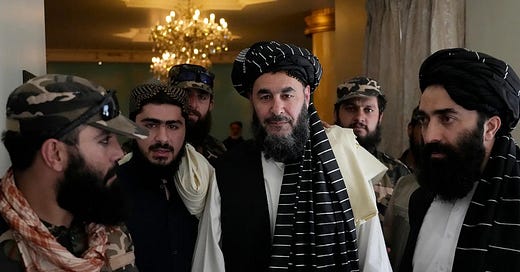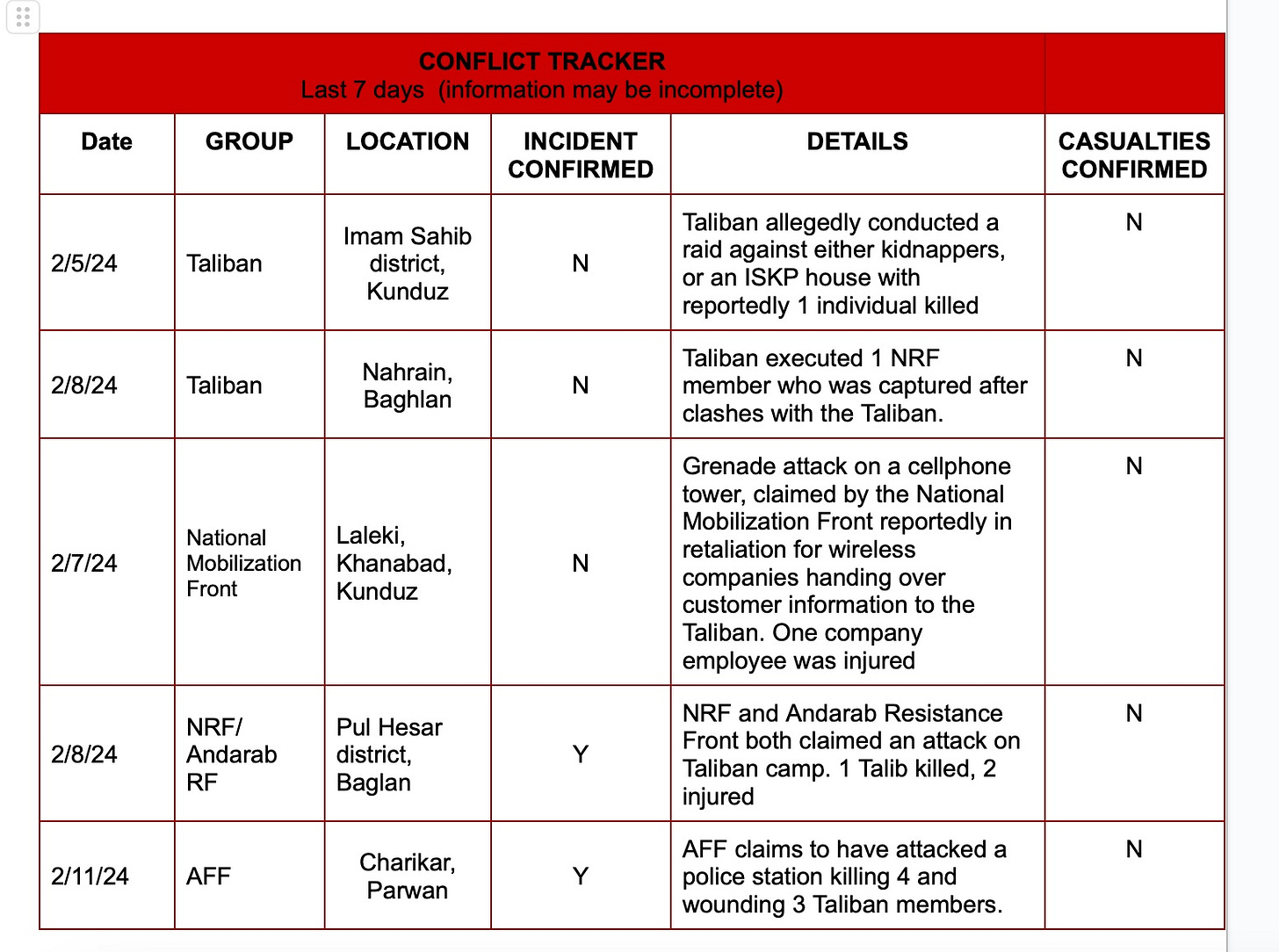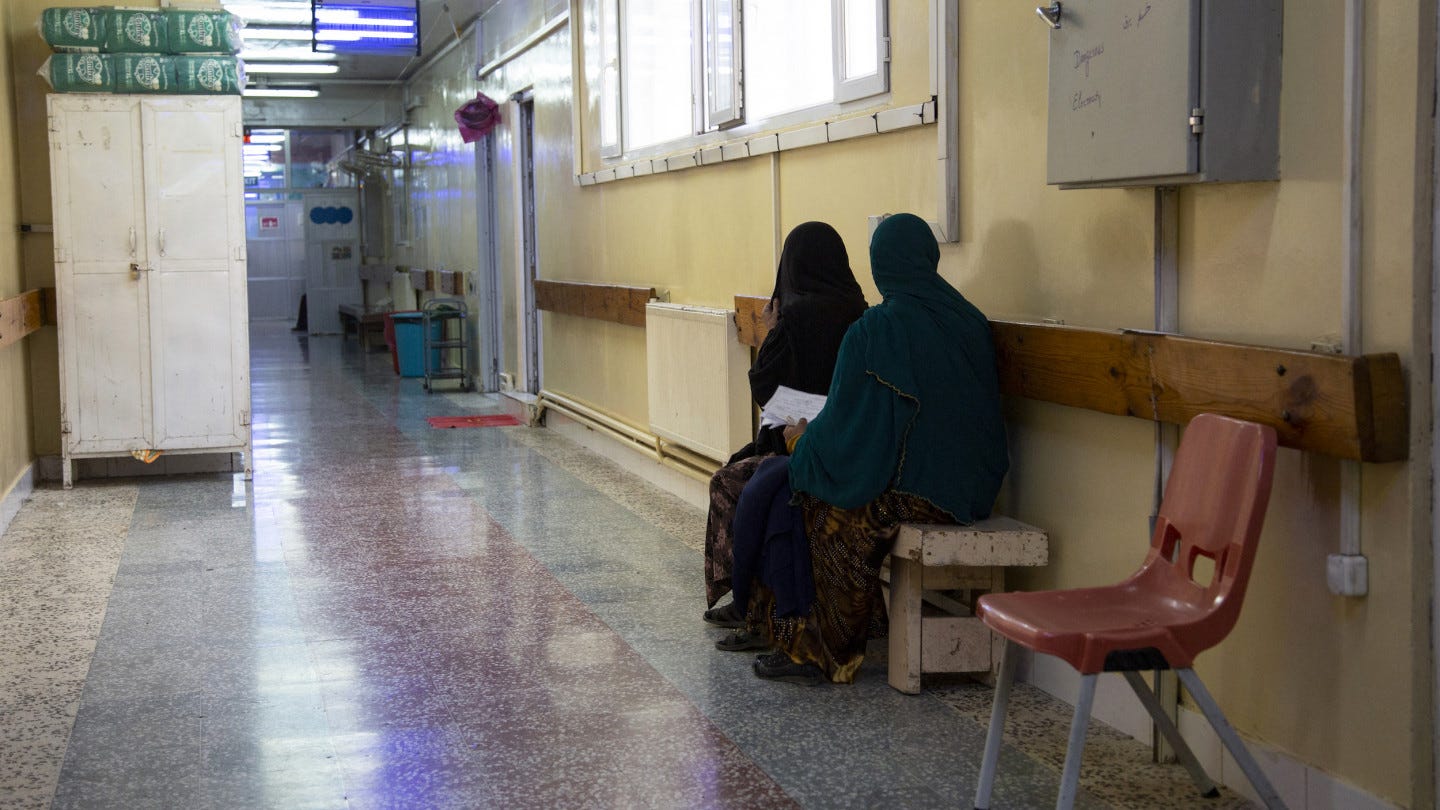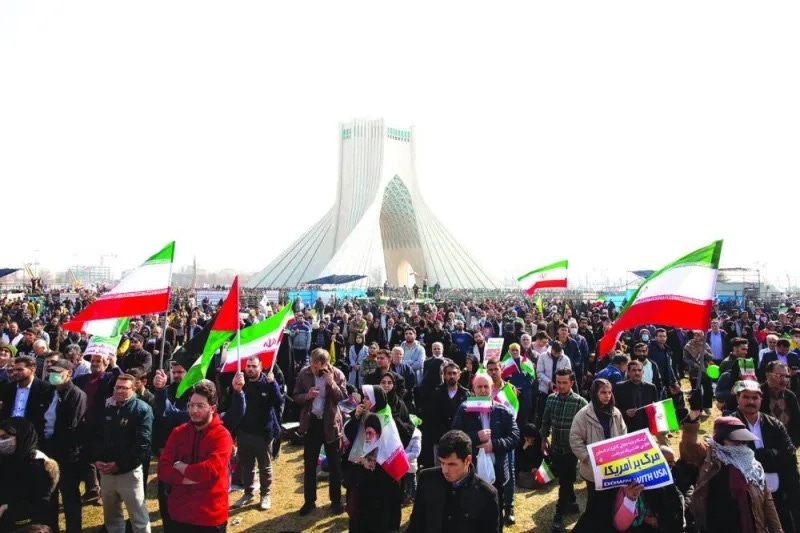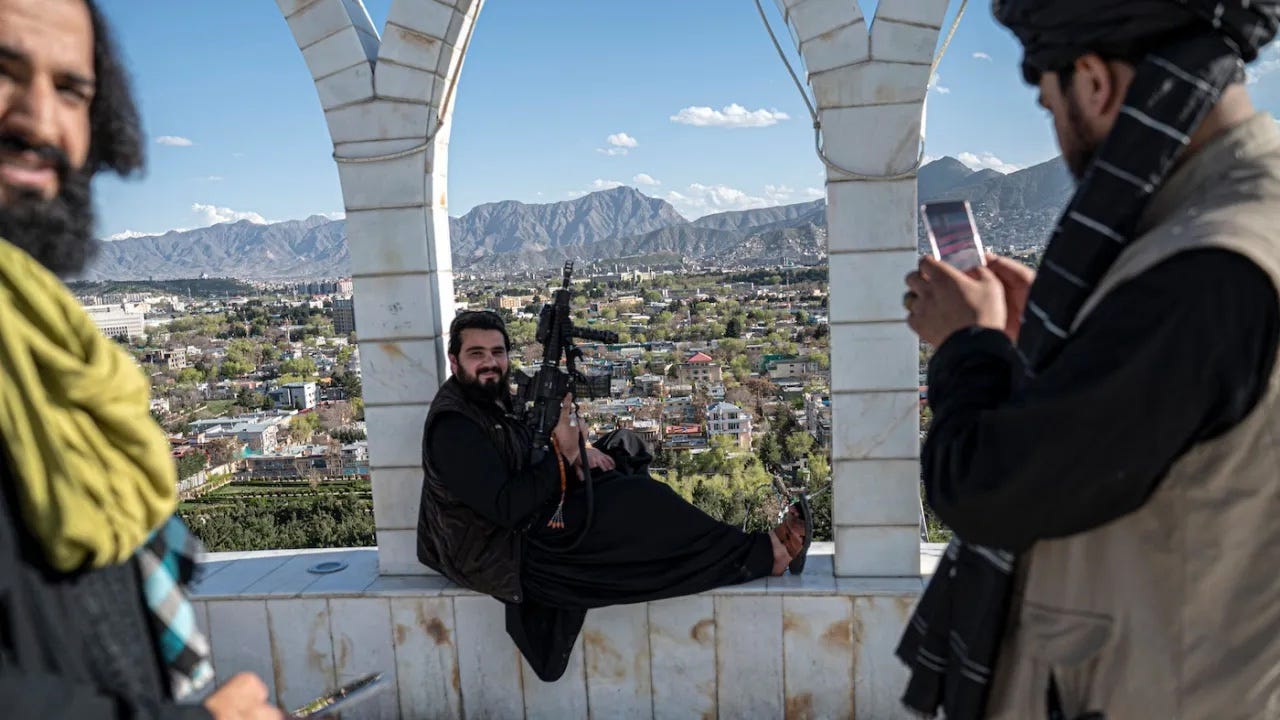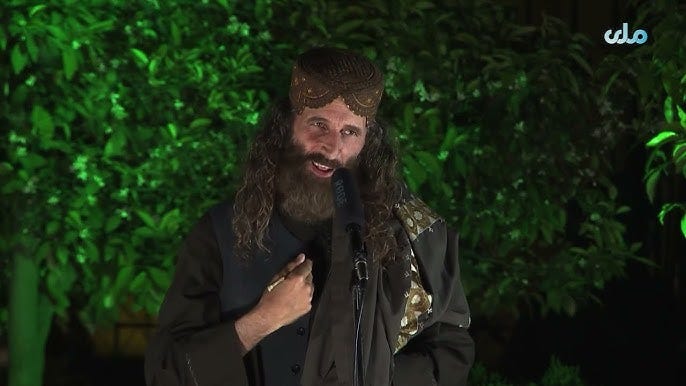The Week of February 5 - 12
Human Rights and Civil Liberties
Street Vendors Beaten in Jalalabad – A video surfaced on Monday of a street vendor who had reportedly been beaten to unconsciousness by the Taliban in Jalalabad. While the video does not show the attack, other vendors indicate that they were also injured by the Taliban for failing to pay bribes. Shopkeepers in Mazar reported similar demands for payment
Detention of Abdul Shakoor – Abdul Shakoor, a cleric who was arrested in Kunduz for publicly criticizing the Taliban's practices of arbitrary detention and torture, remains in custody without any updates on his situation. A voice clip from Taliban Supreme Leader issued in July 2022 has resurfaced declaring that any public criticism of the leadership or officials, even if based on Quranic teachings, is unacceptable. The Taliban's directive that grievances should be addressed directly to them is contradicted by their actions, notably when Shia leaders, seeking acknowledgement for Shia jurisprudence schools, were barred from meeting with Taliban leadership in Kandahar recently.
Activist Detentions – This week there has also been public outcry related to the ongoing detention of Seddiqullah Afghan and Ahmad Fahim Azimi, both arrested by the Taliban on October 17, 2023. Mr. Afghan and Mr. Behtar had worked with the internationally acclaimed Afghan girls Robotics team and have been detained by the Taliban for assisting the team with ‘escaping’, despite the team having been evacuated by the Government of Qatar. More information is available here: Amnesty. It is unknown how many activists, former government members and citizens are currently being held in arbitrary detention by the Taliban.
Pajhwak Journalist Arrested – Saifullah Karimi, a Pajhwok News Agency reporter, was detained in Samangan Province after being summoned to the governor's office. The Afghanistan Journalists Center has demanded his immediate release, expressing deep concern over this incident, marking it as the fourth journalist arrest in three weeks.
LGBTQ Rights Violations – Several reports have emerged over the past weeks detailing the brutal treatment of LGBTQ individuals in Afghanistan under the Taliban. The situation is dire for transgender and gay individuals in Afghanistan under Taliban rule, who are subjected to severe abuse, including being treated as sexual slaves.LGBTQ individuals report the systemic violence, collective sexual assaults, and discrimination they face, painting a grim picture of their struggle for survival and dignity in a regime that vehemently denies their rights and existence. There are reports of over 820 cases of arrest, detention, assault and torture of LGBTQ individuals since the Taliban takeover in August 2021. WARNING - TRIGGER ALERT - GRAPHIC DETAIL Report
Security and Conflict
Searches in Kabul – The Taliban have conducted house to house searches in Police district 11, Khair Khana area of Kabul over the past week. Little information has been provided publicly, but searches should be expected to continue in Kabul in the lead up to the Doha conferences.
Arrests in Panjshir – On Wednesday there were reports of 4 individuals arrested in Panjshir for alleged collaboration with the Afghanistan Freedom Front. Further reports emerged on Thursday of additional arrest on the same charges in Shotol, Rukha, and Annabeh in Panjshir.
Former ANSF Killed – Shafiq (no last name provided), a former ANSF soldier was reportedly killed in Samkani, Paktia by the Taliban. Pictures have emerged of Shafiq’s body showing signs of torture. No further information is available at this time. This is one of at least 4 similar reports of former ANSF soldiers being killed over the past week. Despite claims of amnesty, reports of arrests, detainment, torture and killing of former ANSF personnel by the Taliban are increasingly common.
International Conferences and Trade
UN Special Coordinator for Afghanistan Visit To Kabul – Feridun Shinirloglu met with members of the Taliban regarding the Doha Conference. The Taliban Acting Minister of Foreign Affairs, Amir Khan Motaqi, has stated over the past several weeks that the Taliban has not yet decided if they will participate in the conference. It seems unlikely that the Taliban will attend. The Taliban have previously voiced opposition to the appointment of a Special Representative for Afghanistan and are likely to oppose discussions on gender and ethnic inclusion in government and human rights abuses by the Taliban. While the UN Secretary General has emphasized that Afghan women must be present at the meeting, It is unclear at this time as to who will represent the people of Afghanistan at this conference.
Meeting between UNAMA and Taliban – Thursday, Roza Otunbayeva Head of UNAMA met with Abdul Kabir, Acting Deputy Prime Minister and the Taliban. During the meeting, Kabir reportedly requested that Afghanistan’s permanent seat at the UN be given to the Taliban. This is one of many meetings held in Kabul in the lead up to the Doha meeting.
EU-Central Asia Meeting on Afghanistan – On Thursday, the EU’s special representative for Afghanistan, Tomas Niklasson, announced a meeting will be held next week in Bishkek, Kyrgyzstan, involving the EU, and representatives of 5 Central Asian countries. This meeting aims to address issues concerning Afghanistan, highlighting regional cooperation and dialogue. The announcement was made in Kabul following meetings between Niklasson and Taliban officials, the head of UNAMA, NGOs and former President Hamid Karzai.
Herat-Khawaf Railway Expected to Start – The Herat-Khawaf railway line will start transporting commercial goods from Rozanak station within the next two weeks. This year, it's expected to transport 500,000 tons of goods between Iran and Afghanistan, facilitating exports and imports through Iran's Chabahar and Abbas ports and the Turkish border with reduced tax. A passenger service is also planned to begin in the spring, with an Iranian company planning to move 100,000 passengers in the first year.
Trans Afghan Railway Discussion – The Taliban's Railway Authority announced Qatar's readiness to invest in the "Trans Afghan" railway project during a quadripartite meeting in Tashkent, attended by representatives from Uzbekistan, Pakistan, and Qatar. The project aims to enhance regional commercial and economic development, connecting Central Asia with Pakistan's seaports through a railway spanning over 573 kilometers and costing over $4.5 billion. A follow-up meeting to attract more investors is scheduled for February 19.
NEXT WEEK
Afghanistan – House to house searches, protests and attacks are likely over the next week, particularly in Kabul. In the leadup to the Doha conference civil rights activists, women's rights groups and resistance forces will likely be particularly active to call international attention to their plights and to contest the Taliban depiction of security in Afghanistan. The Taliban are likely to have increased checkpoints, phone searches, house searches and crackdowns during this week.
Pakistan– Those in Pakistan should avoid unnecessary travel, avoid protests, gatherings, group congregations. Protests and violence are likely over the next several days to weeks and the situation may change rapidly and without warning. Afghans caught in crowds are likely to face detention and deportation and should exercise caution at this time. Travel to Pakistan is likely to be impacted over the next week(s) and travel between cities may also be restricted, particularly if martial law is declared. Internet and phone communications are also likely to be limited over the next week(s).
REGIONAL ROUNDUP
IRAN
Landmines on Iran-Pakistan Borders – On February 4, 2024, an explosion near the Iran-Pakistan border resulted in the deaths of two Afghan citizens and injuries to three others amid their crossing into Iran, raising fears that the casualty count could climb. Reports suggest Iran has mined parts of this border, a route frequented by refugees seeking asylum. This act, along with reported harsh treatments by Iranian border guards, including shootings and deportations, starkly violates international norms on refugee protection and human rights.
Fencing Afghanistan-Iran Border – Iran has begun strengthening its border with Afghanistan, focusing on a 74-kilometer section in the Razavi Khorasan region. The project includes barriers, infrastructure, and roads to improve intelligence and readiness. Iran's Interior Minister highlighted the need for comprehensive border protection, beyond just fencing, to prevent illegal crossings.
Afghans Deported from Iran – Deportation of Afghans from Iran continued this week. On Sunday, February 11, Iran and the Taliban Ministry of Refugees confirmed that 900 Afghans were deported through the Islam Qala border crossing. Over the past 15 days a reported 20,000 Afghans refugees have been deported.
PAKISTAN
Proof of Registration Cards Extended – The Pakistani government extended Proof of Registration (PoR) cards for about 1.4 million registered Afghan refugees until March 31, 2024, amid a crackdown on undocumented foreigners. This decision, welcomed by the UNHCR, offers relief to the refugee community, balancing Pakistan's security efforts with its international refugee obligations amidst humanitarian concerns.
TTP Call for Jihad – The Tehreek-e-Taliban Pakistan (TTP), expressing disdain for the electoral process, has urged a call to Jihad with the aim of establishing an Islamic State in Pakistan. They argue that elections fail to bring about an Islamic government, as evidenced by the poor performance of religiously affiliated candidates in the polls. The TTP holds up the creation of an Islamic system in Afghanistan, achieved through Jihad rather than elections, as an example to follow.
TURKIYE
Courthouse Attack – On February 6, 2024, an attack on a courthouse in Istanbul, Turkey, resulted in one civilian death and six others wounded. The attackers, identified as a man and a woman, were shot dead by police during the assault, which was described as a terrorist attack by Turkish authorities. The leftist militant group DHKP-C, recognized as a terrorist organization by Turkey, the United States, and the European Union, was blamed for the incident. Following the attack, Turkish authorities detained 34 individuals for their alleged connections to the incident. The DHKP-C has a history of launching attacks and suicide bombings in Turkey since the 1990s.
IS in Turkey – Over the past week, Turkish authorities have arrested a significant number of individuals suspected of being members or supporters of the Islamic State (IS). In one major operation, police detained 21 individuals suspected of IS affiliations, among them three foreigners. The operation covered several provinces, including Istanbul and Sanliurfa near the Syrian border. Items seized during the arrests included hunting rifles, bullets, IS documents, electronics, and military uniforms, highlighting the serious nature of the threat posed by these individuals
In another operation following an attack on a Roman Catholic church in Istanbul during Sunday Mass, which left one person dead, Turkish Interior Minister announced the arrest of two men described as members of the Islamic State extremist movement. Subsequently, a total of 47 people were detained as part of the investigation into the attack.
SPOTLIGHT ANALYSIS
TAD Original Analysis on Pakistan Elections
The Pakistani military's influence in shaping the country's political landscape is widely acknowledged, often favoring certain political factions to ensure its interests are safeguarded. This influence extends deeply into the government, particularly benefiting those from Punjab, Pakistan's most populous province, while other groups might feel overlooked. Despite this, a form of democracy is maintained, largely seen as a way for the military to legitimize its control.
In terms of election strategy, the military has been open to the participation of religious parties, a move that serves multiple purposes. Domestically, it projects a sense of inclusiveness, contrasting sharply with nations where such groups are banned. Internationally, it helps to counter fears of a potential shift towards theocracy, presenting the military as a secular force capable of maintaining stability in a predominantly Muslim country. This dual approach helps maintain alliances with Western nations while also supporting the military's interests.
Recent election results have highlighted several key trends: voter apathy in certain regions, declining popularity for state-backed leaders, and significant support for candidates endorsed by the imprisoned former Prime Minister Imran Khan, indicating widespread dissatisfaction with military interference in politics. These outcomes could lead the military to broker a coalition, likely resulting in a weakened civilian government under its sway.
This nuanced dynamic between the military's control and the semblance of democracy raises questions about the sustainability of such governance against the backdrop of economic challenges and a young, restless population seeking change.
Elections at the Crossroads: Pakistan's Political Shifts and the Afghan Shadow
The recent elections in Pakistan and their implications for Afghanistan present a pivotal moment in the complex interplay of regional politics, insurgent dynamics, and military influence. Amidst Pakistan's evolving political landscape, marked by the military's strategic maneuvers and the electoral rise of factions sympathetic to or directly challenging the military's dominance, the shadow of Afghanistan's situation looms large. The resurgence of the TTP, emboldened by the Afghan Taliban's ascendancy, underscores the transnational nature of the security challenges facing Pakistan. This resurgence poses critical questions about the sustainability of Pakistan's governance model, heavily influenced by military oversight, in addressing both internal security concerns and cross-border insurgent threats.
The election results reflect a nuanced narrative of public discontent with military intervention in politics, alongside apprehensions about the growing influence of religious militancy. These concerns are magnified by the TTP's bold aspirations for an Islamic government in Pakistan, echoing the governance model in Afghanistan. This scenario complicates Islamabad's balancing act between securing its borders, maintaining political stability, and navigating its contentious relationship with the Taliban-led Afghanistan. The interdependence of Pakistan's internal security dynamics and Afghanistan's political landscape highlights the need for a strategic recalibration, focusing on diplomatic engagement and comprehensive counter-insurgency measures.
Looking ahead, the interplay between Pakistan's election outcomes and Afghanistan's stance under the Taliban regime will significantly shape the regional security architecture. The potential for increased TTP-led violence within Pakistan, coupled with the Afghan Taliban's ambivalent position, underscores the urgency for Islamabad to forge a coherent strategy that aligns military objectives, political stability, and regional diplomacy. The evolving narrative suggests a critical juncture for Pakistan in redefining its approach to governance, counter-terrorism, and bilateral relations with Afghanistan, amidst the overarching shadow of military influence.
AFGHAN NEWS
Taliban Management of the Education Sector
Afghan Witness
This report aims to provide an update on the state of education in Afghanistan in 2023, and builds on previous AW reports on the sector. It examines the Taliban’s stated vision for education, based on communications from the Ministry of Education and senior Taliban officials - including the Supreme Leader - and compares it with the reality experienced by practitioners, institutions, and students in the country.
Taliban admits liquidity issues in select banks
Amu TV
In a meeting hosted by Taliban-run Central Bank, or Da Afghanistan Bank, to address the sector’s issues, Baradar pointed out that one or two banks are particularly struggling with liquidity problems. He did not name the banks.
Humanitarian Aid Distribution in Herat Province: Taliban and Landlords Receive Lion’s Share
8 AM
Many residents of Herat Province claim that the Taliban have repeatedly received humanitarian aid for themselves and their affiliates. According to their accounts, the Taliban have taken back these aids from the people after distribution. These residents emphasize that the share of the poor and hungry from humanitarian aid is “none” and most of this aid is distributed to landlords, district council heads, Taliban members, and individuals affiliated with this group.
Dying every two hours: Afghan women risk life to give birth
The New Arab
Zubaida traveled from the rural outskirts of Khost in eastern Afghanistan to give birth at a maternity hospital specializing in complicated cases, fearing a fate all too common among pregnant Afghan women — her death or her child's.
REGIONAL NEWS
Iran marks anniversary with demand to expel Israel from UN
Gulf Times
Iran marked 45 years since its Islamic revolution with a ceremony yesterday in which President Ebrahim Raisi condemned Israel over the Gaza war and demanded it be expelled from the UN.
How an Afghan Drug Kingpin Became Beijing’s Man in Kabul
Lynne O’Donnell
A drug kingpin whose heroin empire helped fund the Taliban’s long war in Afghanistan—and who was released early from a U.S. prison in a trade for an American hostage—has now gone into business with China.
INTERNATIONAL NEWS RELATING TO AFGHANISTAN
IOM in #Afghanistan is aware of platforms impersonating the Organization and promising assistance in return for personal information. IOM provides information about its assistance on its official platforms only.
OPINION: American diplomats should stay out of Afghanistan
Annie Pforzheimer & M. Ashraf Haidari
While the world has paid close attention to wars and atrocities elsewhere, Afghanistan’s people have been ruled by a sanctioned extremist group since 2021 that keeps public order through force and coercion. The depth of Taliban depravity includes extrajudicial killings, silencing free speech and even kidnapping teenaged girls on the grounds that they are “improperly” covered and holding them in prison, where they are subject to torture and rape.
THE DAILY WTF
"Poison and Prostitution Under the Guise of Vaccines."
‘Ikramuddin Maftoon, a jihadist poet and a Taliban official in Eastern Afghanistan, wrote on his X account today that the "deceiver army of Jews," referring to NGOs, is bringing together stranger* girls with boys under the pretext of vaccination campaigns, which he labeled as essentially a prostitution campaign. The placard he posted on X reads, "Poison and Prostitution Under the Guise of Vaccines."
Maftoon, known for his anti-NGO stance, has maintained close ties with TTP and other foreign militants in Afghanistan.
* Not connected through marriage or blood.’
No comment needed- TAD
Afghani to the Dollar: $1 – 73.69 AFN (as of 11 FEB 2024)

